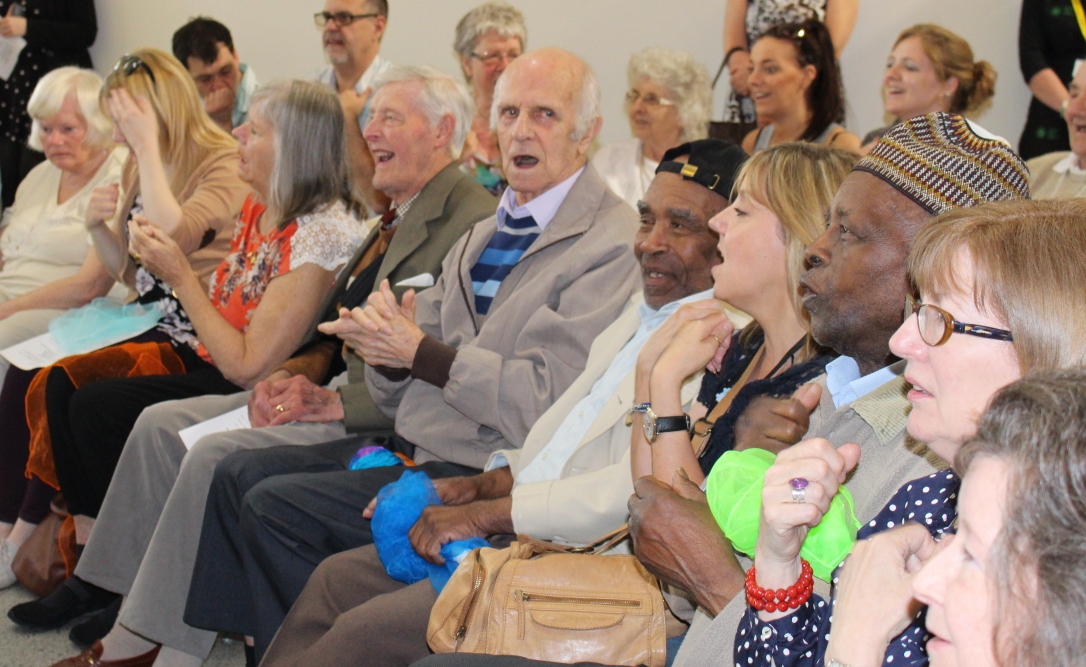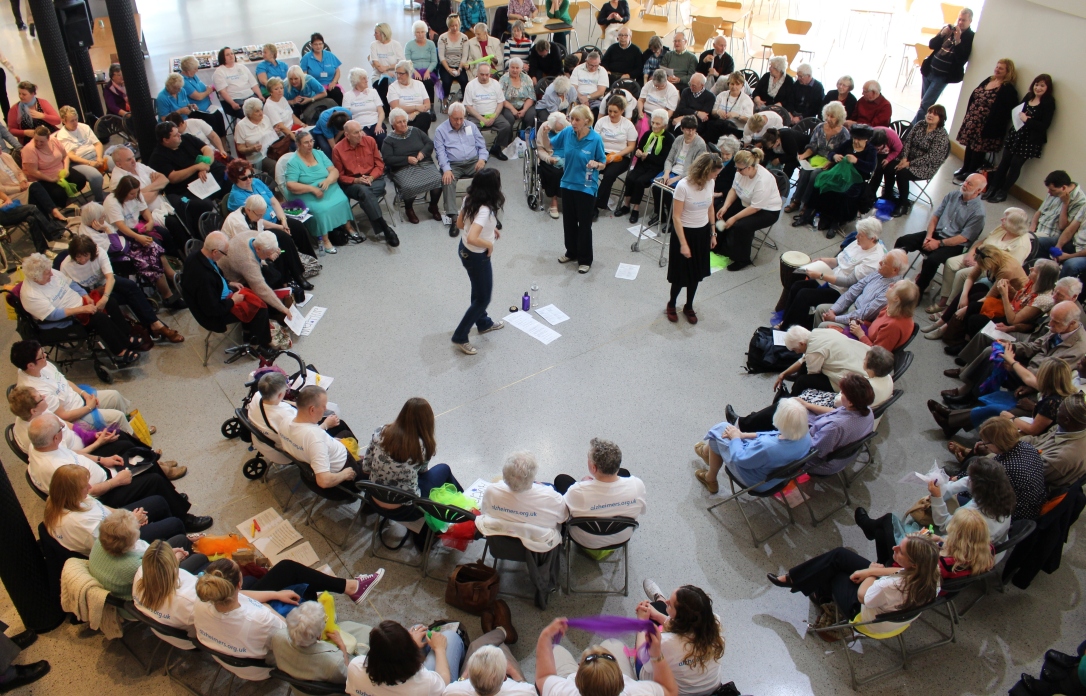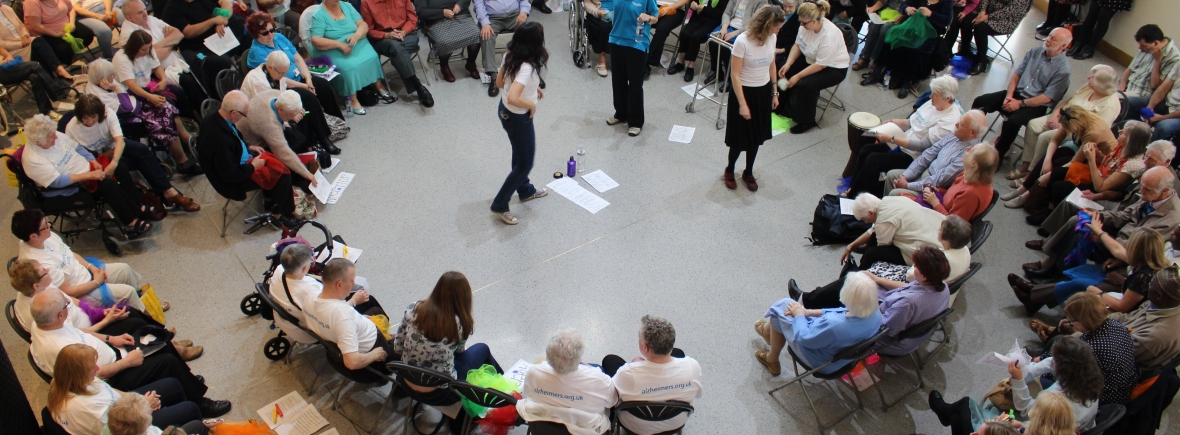What is Singing for the Brain®?
Alzheimer’s Society says of its ground-breaking programme ‘Singing for the Brain®’ :
‘This person-centred programme enables people with dementia and their carers to engage in the benefits of structured community singing. It involves singing and gentle exercise, with an emphasis on enjoyment, participation and equality. Singing is not only an enjoyable activity; it can also provide a way for people with dementia, along with their carers, to express themselves and socialise with others in a fun and supportive group. Hidden in the fun are activities which build on the well-known preserved memory for song and music. Even when many memories are hard to retrieve, music is especially easy to recall.’
The programme is suitable for those with a diagnosis of early onset to mid-stage dementia and promotes communication through singing and other activities (no previous musical experience is necessary). Each session and group is different as experienced facilitators tailor song complexity and content to the mood and capacities of the groups on the day. The benefits on health and well being of this programme have been well documented for the person living with dementia, and also the carer, who plays an important role in the session.
Some of the stated aims for Singing for the Brain® are:
- To improve and maintain neurological pathways through gentle aerobic activity
- To lift or prevent depression and reframe a negative life viewpoint into a positive one
- To encourage carers and people living with dementia to be pro-active in looking after themselves and to network with others
- To give families a view of themselves as managers of their life – not victims of fate
Research results list the following benefits of Singing for the Brain® :
- Social inclusion and support
- A shared experience
- Positive impact on relations (especially between carer and person living with dementia)
- Positive impact on memory
- Lifting the spirits
- Acceptance of the diagnosis University of Nottingham, UK (2014)
How does Singing for the Brain work®?
Socialising over refreshments precedes the session and provides an important opportunity for interaction and invaluable peer support. The format of the hour-long session is clear and its predictability helps orientate participants. A person-centred focus underpins the session ensuring participants’ contributions, and stories that are woven into the structure, make each group’s journey unique. A typical session comprises five stages:
- A short ‘informal’ vocal and physical warm-up
- Greeting song
- Introduction to / revision of new material
- Familiar songs and wind down
- Farewell song
To stimulate short-term memory and aid concentration, unfamiliar, adapted or newly written material is introduced to provide a positive challenge; the material – carefully calibrated – includes rounds, action, partner songs and tongue twisters, sometimes with the use of props and percussion instruments. This part of the session provides opportunities for the person living with dementia to achieve on an equal basis, as both cared-for and carer learn unfamiliar material.
The latter part of the session stimulates long-term memory recall when much-loved songs from the past are sung. Emotional associations contained within these favourites prompt reminiscences and participants may experience a sense of re-validation and empowerment as their narratives are witnessed, acknowledged and ‘held’ by the group.
The benefits of Singing for the Brain® for both cared-for and carer accrue with regular attendance, enhancing well-being and levels of self-confidence; the casual observer may be hard-pressed to distinguish between the person living with dementia and carer when a group is in full flow.
With kind permission, here is a sample of what carers attending Singing for the Brain® have said about their experience:
‘We’ve been regular members of the group for almost a year and I would like to emphasize how beneficial it has been for Lucy to take part in these regular weekly sessions of learning and remembering the catchy little songs that are introduced to us. Lucy responds with enthusiasm and sings along with me and the rest of the group with such obvious enjoyment. For that hour at least, Lucy becomes part, once again, of our normal interactive world – to her obvious benefit.’ J. A. (Father – carer to his daughter) Merthyr
‘More than anything, the group understood how I felt and showed Mum so much respect and patience. Both Mum and I felt better at the end of each session.’ C.C. Porth
‘We find it really helpful, it’s very sociable and helps my husband meet people in a similar position to him. I’m also able to speak to other carers and get advice. We particularly enjoy the tongue twisters. We’ll be out and about and a word will trigger one and Wayne will just start singing. My husband comes alive when he sings, it brightens him up. My voice has improved too. ’ M.E. Aberdare
‘Singing ‘Daisy’ brought back memories of the good times my mother had with her husband. Her frustration at forgetting is diminishing and she’s talking enthusiastically about her experience of Singing for the Brain to the family. The laughter is also contagious and my mother has begun to laugh with excitement once more. It’s enabling and, as her carer, I need my mother to be enabled not disabled.’ O. R. Cardiff
For video clips of sessions, interviews and more information please visit the following websites:
- Alzheimer’s Society, UK: Singing for the Brain®
- NHS Videos: Singing for the Brain®
- Institute of Mental Health, University of Nottingham, UK:
- The Sydney De Haan Research Centre for Arts and Health:
- The International Longevity Centre, UK: Report on Dementia and Music 2018



